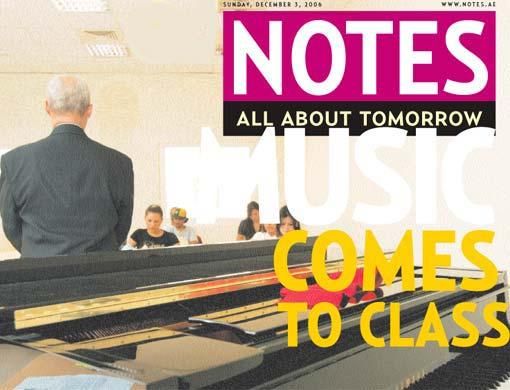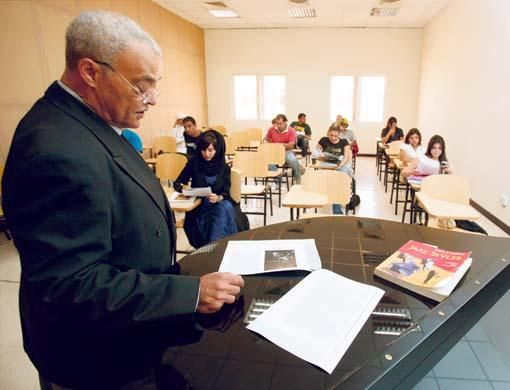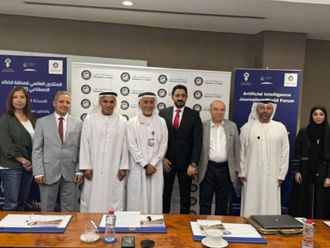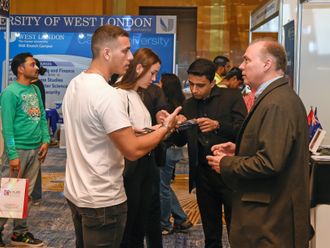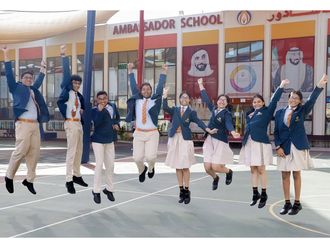The American University of Sharjah has become the first university in the country to introduce music classes as part of its general education offerings.
Dr Lowell Dwight Dickerson was appointed to take on the position as the professor of music and newest faculty member in the College of Arts and Science (CAS). With his Ph.D. in ethnomusicology from the University of California in Los Angeles and master's degree in jazz studies from the University of Southern California, Dr Dickerson is in AUS to teach three new courses in music appreciation.
The courses range from a variety of topics in music: Introduction to European Classical Music, History and Development of Jazz, and Survey of World Music.
“These classes are to teach historical styles and the evolution of music. Knowing the history of music is step one; that is [in] classes in music theory and performance,'' said Dickerson.
CAS is planning to expand the music programme depending on student interest. Chancellor Winfred Thompson said: “We have to wait and see if there is sufficient student interest and we will respond to that accordingly.''
Feedback on the introduction of the courses has been positive. With all the classes filling up fast and currently upto capacity, students have indeed shown their enthusiasm to learn about music.
“We hope to develop into a full-fledged music programme but currently we are only hoping to formulate a music foundation,'' Dickerson said.
More choices
The motivating factor behind the addition of the courses, as Thompson explained, is to increase the course choices for students. “This is part of a larger effort to expand course offerings in the humanities and liberal arts departments so students can have more choices, as they would have in any other university in the US or elsewhere.''
Thompson explained that AUS has been emphasising major courses until now. “We recognised the need to expand our course offerings in the general education area and music was an appropriate way to do that, especially due to student interest.''
Furthermore, Dr William Heidcamp, dean of CAS, said: “If you look at any American university's liberal arts programme there is music and arts in the programme.''
The facilities
AUS and specifically CAS have made an effort to provide suitable facilities for the classes. The walls have been sound-proofed and a grand piano has been installed in the Physics 221 classroom, which is home to Dickerson's three courses. There are long-term plans to transform the room into a music studio.
Teaching tools
Regarding his methods of instruction, Dickerson said he uses a variety of tools including CDs, DVDs, and the piano. CDs are useful for students to hear the music while DVDs, which feature documentaries or live performances, are played. As soon as the piano arrived, Dickerson began to play it regularly in class since he believes it is an effective and more comprehensive way for students to understand the rhythms and sounds of the music being played.
Teaching these introductory music courses has given Dickerson an idea about the student talent available on campus. He said: “A vast majority of people I have met are guitar players and play rock and roll music.''
At the Student Centre, Dickerson said he has heard students playing on the piano. In addition, he has noticed how prevalent the oud is particularly in Arab culture. With this kind of musical talent latent in students, he said he believes there is great potential for the music programme to grow.
Plans ahead
He has noticed the absence of a student orchestra and the shortage of musical performances. “I have ideas to make music a valuable and vital element in AUS.'' For example, Dickerson plans to organise a piano club for student pianists.
Another idea, planned for the end of the semester, is a series of concerts with performances featuring varied types of music and musicians. Titled ‘Music, A Path to World Peace,' the concerts will raise money for the people of Lebanon, Darfur and Palestine. Dickerson already has a salsa band from Los Angeles and a piano drum trio with a lead vocalist scheduled to perform for the cause.
A jazz pianist, Dickerson even plans to perform weekly with fellow professional musicians at the Student Centre.
Cultural sensitivities
The university has given thought to the cultural sensitivities of launching such a programme. “You have to take into account the sensitivity of the culture so this must be done cautiously, conservatively and with sensitivity,'' said Heidcamp.
Thompson said: “One of the things about Dickerson that was appealing to this university is that he is familiar with this part of the world and the cultural considerations that we need to keep in mind,'' he said.
Dickerson said that although the hope is “to develop into a full-fledged music programme, currently we are only hoping to formulate a music foundation.''
The future
It is also likely that the university's new programme may some day collaborate with Culture Village in Dubai. Dickerson said: “We are interested in cultural assimilation and cultural issues. AUS is interested in community outreach … . There may be opportunities …''
Student perspectives
Junior accounting and finance student Fatima Salim said: “When I heard about the music courses being offered, I decided to take one because I wanted to improve my skills in music. I did not know anything about music before.''
The multimedia teaching platform of the courses is intriguing, she said.
Watching films on DVDs and listening to music — whether live or recorded — help to instill the information in memory, she said.
“I recommend this course especially for people who don't know much about music because it has helped me learn something new,'' Salim said.
Stephanie Mahmoud, a senior marketing and management student, said: “I thought it would be interesting to take a course in music because it has never been offered before.'' Stephanie has studied piano for three years.This course, she said, “is different from what people are accustomed to, especially in this part of the world. Also, young people are not accustomed to listening to classical music''.
She is optimistic about the possible development of a full music programme, especially with what she believes is sufficient student interest and a highly capable instructor. “We are lucky to have a musician like Dr Dickerson. He is an amazing musician and he set a very high standard to follow.''
How the programme works
- Each music course counts as three credits
- Students from any major can enrol.
- The programmes are introductory classes designed to inform students about the history of the music genre(s), the various styles of music and important musical contributors.
Survey of World Music:
- It examines the interaction of culture and music throughout the world.
- Students are expected to provide a presentation about the music — a cultural background.
- By the end of the semester, students would have studied the influences and importance of music in the African, Asian, North American and South American cultures.
ntroduction to European Classical Music:
- It examines classical music and various composers. The musical contributions of legendary musicians such as Beethoven, Bach, Brahms and Chopin are studied.
- In class, students are exposed to recorded classical selections as well as live piano samples.
- They must be able discern between the various musical pieces and their composers.
History and Development of Jazz
- Focused on the specific genre of jazz music.
Students learn about jazz from its origins in the 1850s until the present. A rare art form that sprang from the period of slavery in the United States, jazz is a combination of African roots and heritage enhanced by the influences of European scales and instruments. - The contributions of famous jazz musicians are studied and include those of Louis Armstrong, Duke Ellington, and Scott Joplin.
Academic music classes
- Dr Lowell Dwight Dickerson, who teaches the courses, considers them as academic music classes.
- Plans for next year, he said, include the addition of theory classes in which students will learn musical notes and scales. This would consequently lead to performance since students will be prepared to play instruments.
How music helps you
Among the benefits, said university professor Richard McClane, are helping to loosen up the body, especially from a long day of stress. Also, since “it exercises the brain and the mind,'' it helps enhance creativity not only in music but in other areas as well.
“If you suppress creativity, then you will not be innovative in areas such as science and technology,'' McClane said. Therefore, he believes AUS should further encourage creativity. “If we provide space for students to experiment, they will produce things in music, in science, and in other areas.''
Helps channel energy
Dr Lowell Dwight Dickerson, professor of music at the AUS College of Arts and Science, said: “It helps to channel energies and remain disciplined. Music elevates the consciousness as it makes you think independently and become aware of the things around you and how you can make things better.''
Therefore, he believes a strong music programme would make one think more critically about the self as well as the universe. “It is a barometer in terms of overall perspective,'' said Dickerson.
The study of music, also contributes to the development of a well-rounded person. “Our classes are multi-disciplinary courses that incorporate geography, history, world events, culture and tradition,'' he said. “[As] it adds to a person's knowledge of the world and ability to contribute on a personal basis, it contributes to a more polished and accomplished person.''
Although still in the distant future, “the long-term goal is to have the top music programme in the Middle East,'' said Dickerson.
The writer is a mass communication student at the American University of Sharjah


